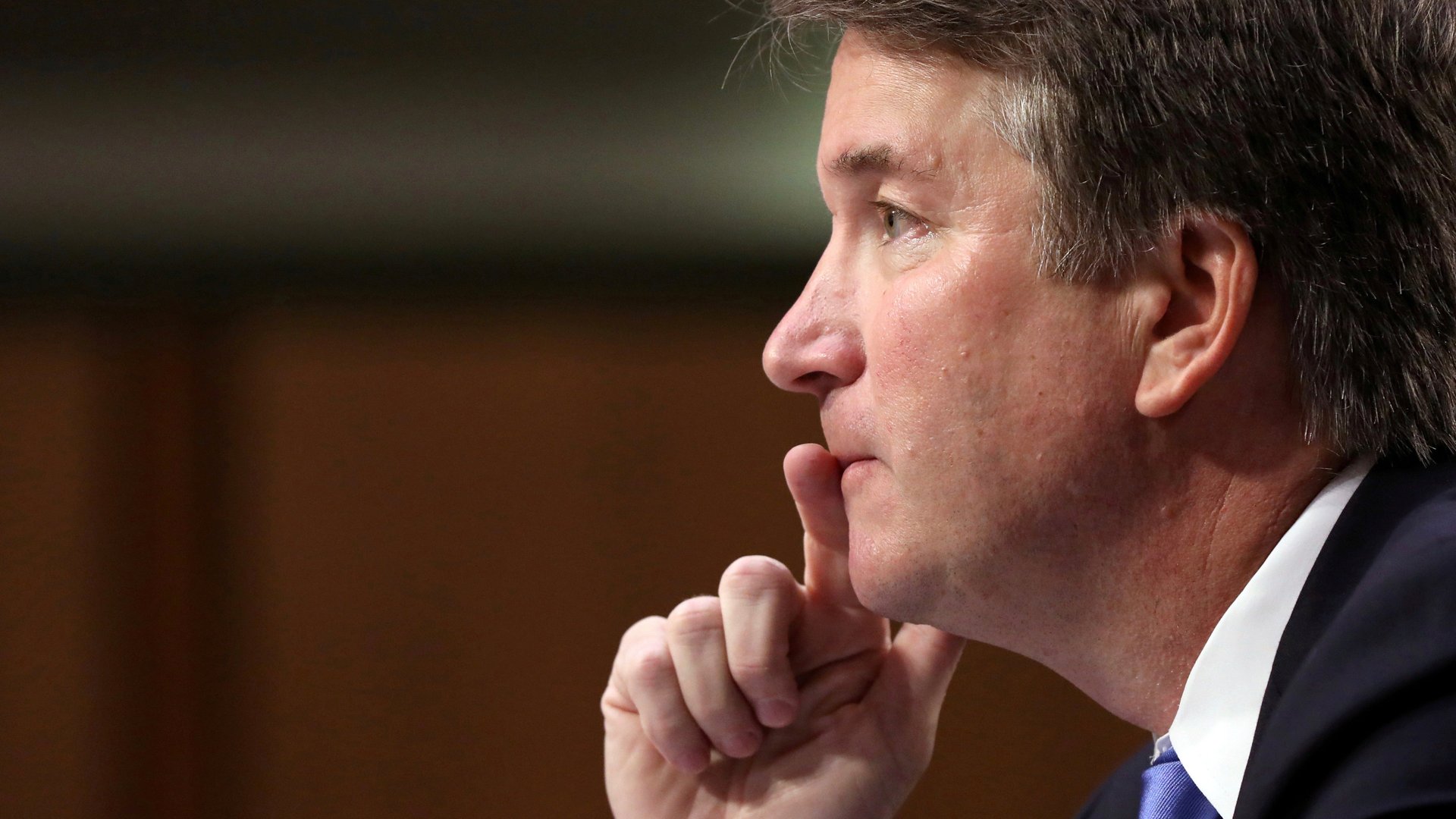Kavanaugh makes the absurd claim that sexual misconduct allegations will scare off good people
Earlier this month, Christine Blasey Ford accused US Supreme Court nominee Brett Kavanaugh of sexually assaulting her when they were in high school in the 1980s. Ever since, his supporters have argued that under such standards, no man would be willing to submit himself to scrutiny about his fitness for public service.


Earlier this month, Christine Blasey Ford accused US Supreme Court nominee Brett Kavanaugh of sexually assaulting her when they were in high school in the 1980s. Ever since, his supporters have argued that under such standards, no man would be willing to submit himself to scrutiny about his fitness for public service.
Today (Sept. 24) Kavanaugh himself adopted this argument. In a letter to the Senate Judiciary Committee, addressing newly reported sexual misconduct allegations by his former Yale undergraduate classmate Deborah Ramirez, Kavanaugh writes:
These are smears, pure and simple. And they debase our public discourse. But they are also a threat to any man or woman who wishes to serve our country. Such grotesque and obvious character assassination—if allowed to succeed—will dissuade competent and good people of all political persuasions from service.
The nominee vows not to withdraw his name from consideration for the high court, saying he owes it to his family and women who have publicly supported him to defend his integrity and his name. “I will not be intimidated into withdrawing from this process. The coordinated effort to destroy my good name will not drive me out,” Kavanaugh writes.
Notably, he’s not alone in expressing concern about what the allegations mean for the future of government. In response to Ford’s accusations against Kavanaugh, Ed Rollins, current co-chairman of the pro-Trump Great America PAC told The Daily Beast on Sept. 16, “If this is the new standard, no one will ever want or be able to serve in government or on the judiciary.”
This sentiment was recently echoed by Republican representative Steven King of Iowa at an Iowa Faith & Freedom Coalition event on Sept. 22. “I’m thinking, is there any man in this room that wouldn’t be subjected to such an allegation,” he asked. “A false allegation? How can you disprove something like that? Which means, if that’s the new standard, no man will ever qualify for the Supreme Court again.”
These arguments are troubling for several reasons. First, they imply that it’s somehow a new standard to require public servants to be free of criminal accusations blemishing their record. In fact, a high court judge’s past must be unimpeachable, and considerations of character are paramount. Second, they imply that Kavanaugh’s accusers are lying. And lastly, their statements suggest that men are the victims in a culture where women go about making false accusations with abandon. This is a neat trick that flips the script by ignoring evidence of the prevalence of abuse claims from thousands of women who have spoken up in the wake of the #MeToo movement.
Some people seem to agree with the disingenuous position nonetheless. They claim on Twitter that accusations like the ones the Supreme Court nominee faces dissuade people from taking public service jobs.
But many rightly counter that people who know they want to go into public service must be extremely careful, and act accordingly.
Kavanaugh’s position that he will keep fighting to be confirmed for the Supreme Court is personal. It’s not for the benefit of future discourse or the men and women who will be dissuaded to someday serve their country. “Competent and good people” who aspire to the highest court in the land, or even less lofty positions, should be able to withstand the scrutiny these jobs demand.
The current nominee may not have what it takes. Michael Avenatti, the lawyer for Stormy Daniels, announced today that he is representing a third woman who also accuses Kavanaugh of misconduct and is in talks with senators.
It should not be impossible to find Supreme Court justice nominees who conduct themselves appropriately in youth and adulthood. If those with dark secrets are deterred from seeking pubic service positions by Kavanaugh’s nomination process, that’s probably for the best.
In any case, the public discourse does not benefit from false claims that a “new standard” is being articulated. All that’s happening is that people are asking questions in view of new information. Namely, whether Kavanaugh is qualified to sit on the Supreme Court, and if he meets the minimum requirements for the most important law job in the land.